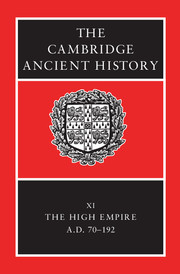Book contents
- Frontmatter
- PART I NARRATIVE
- PART II GOVERNMENT AND CIVIL ADMINISTRATION
- PART III THE EMPIRE
- PART IV ROME, ITALY AND THE PROVINCES
- PART Va ECONOMY AND SOCIETY
- 23 The land
- 24 Trade
- 25 Industry and technology
- 26 Commerce and finance
- 27 Demography
- 28 Status and patronage
- 29 Family and household
- PART Vb ART AND CULTURE
- Chronological Table
- BIBLIOGRAPHY
- Index
- 1 The Roman world in the time of Marcus Aurelius
- 7 The Danube provinces
- References
28 - Status and patronage
from PART Va - ECONOMY AND SOCIETY
Published online by Cambridge University Press: 28 March 2008
- Frontmatter
- PART I NARRATIVE
- PART II GOVERNMENT AND CIVIL ADMINISTRATION
- PART III THE EMPIRE
- PART IV ROME, ITALY AND THE PROVINCES
- PART Va ECONOMY AND SOCIETY
- 23 The land
- 24 Trade
- 25 Industry and technology
- 26 Commerce and finance
- 27 Demography
- 28 Status and patronage
- 29 Family and household
- PART Vb ART AND CULTURE
- Chronological Table
- BIBLIOGRAPHY
- Index
- 1 The Roman world in the time of Marcus Aurelius
- 7 The Danube provinces
- References
Summary
‘ORDINES’: THE ROMANS' CONCEPTION OF THEIR SOCIAL ORDER
The literate élite of the Roman empire in the second century conceptualized the social order as a stable and equitable hierarchy worthy of high praise. Aelius Aristides (ad Romam 39) distinguished in a simple fashion between the great and the humble, the rich and the poor, the notable and the commoner. Rome's achievement, in his view, was to extend a system of government that treated all subjects fairly and offered citizenship to all who deserved it (59). Aristides' vision of society, then, was based on a broad binary division and justified by his sense of fairness.
Other imperial authors present a more precise categorization in the form of a hierarchy of ordines. The good emperor was one who protected the social order by granting rank in accordance with the traditional aristocratic criteria of birth, wealth and excellence. In a speech put into the mouth of Maecenas, Dio recommended choosing as senators ‘tous te gennaiotatous kai tous aristous tous te plousiotatous’, and the equestrian ordo was to be filled with ‘such men as hold second place in their regions as regards birth, excellence and wealth’ (LII.19.1–4). The same criteria, but on a more modest scale, were judged appropriate for the ordo decurionum. Wealth was guaranteed by a census requirement for each ordo: 1 million sesterces for senators, 400,000 for equites, and something less for decurions (Pliny, Ep.1.19, gives 100,000 for Comum). The rules concerning birth took the form of exclusion of those tainted by servile origins: two generations of free birth were required of equites, and the curial ordo was generally closed to freedmen.
- Type
- Chapter
- Information
- The Cambridge Ancient History , pp. 817 - 854Publisher: Cambridge University PressPrint publication year: 2000
References
- 6
- Cited by

